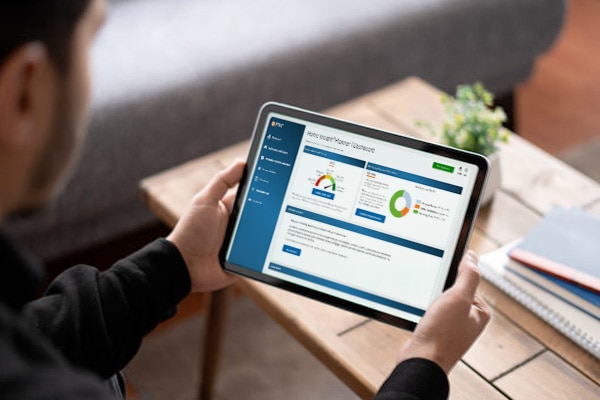Read a summary of privacy rights for California residents which outlines the types of information we collect, and how and why we use that information.
Jumbo Loan Mortgage
For home financing options
above $832,750
Overview
Facts & Figures
If you’re looking to buy a home in a higher price range, you’ll most likely need a special type of mortgage. With a Jumbo Loan from PNC, you can finance up to $5 million.
- Standard fixed or adjustable rate terms.
- Loan terms between 15 and 30 years.
- Finance between $832,750 and $5 million.
- Adjustable rate loans are available in periods of 5, 7, or 10 years during which the interest rate remains unchanged, followed by an adjustment period in which the interest rate may increase or decrease on an annual or semi-annual basis, dependent upon the product, resulting in a change in your monthly payment amount.
- Available for both primary and second homes. Down payment and closing costs can be from a gift.
- Borrower will generally need assets beyond those needed for the loan transaction (including required reserve assets).
- Interest-Only option.
Cost & Fees
Typically these fees range from 2% to 6% of the loan amount.

Jumbo Loan FAQ
Top customer questions about jumbo loans.
If you need to borrow more than the Fannie Mae's and Freddie Mac's standard loan limit, $832,750 for a single family home in most places, you may need a Jumbo Loan. Limits may vary for multi-family homes.
There are few factors that determine how much you will be qualified to borrow: credit history, debt-to-income ratio and your down payment.
Requirements
| Credit History | Specific credit requirements vary based on a range of criteria including loan-to-value and debt-to-income ratios used to qualify for the loan. |
| Debt-to-Income Ratio | Debt-to-income (DTI) ratios measure how much of a client’s income is allocated to repaying debt obligations. To help prevent clients from overextending themselves financially, PNC considers DTI ratios when reviewing applications for mortgage loans. To calculate an estimate of your DTI ratio, simply divide your total monthly debt payments (including your future monthly house payment) by your total monthly gross (pre-tax) income. It is typically recommended to keep your DTI ratio at or below 36%. However, certain products and programs may allow for a higher DTI ratio based on the different loan characteristics. A PNC Mortgage Loan Officer will help determine your specific DTI ratio requirements. |
| Down Payment | Jumbo mortgages can be used to buy a home with as little as 15% down, when subordinate financing is obtained, or 20% down with no additional financing. Ranges may vary based on loan details, consult a Mortgage Loan Officer for additional information. |
| Assets | Borrower will generally need assets beyond those needed for the loan transaction. |
Your rate is calculated based on a variety of factors, including credit qualifications, loan-to-value, loan amount and other criteria, but generally may be higher than a conventional loan interest rates.
Mortgage Calculators
Comparing loan options? Just looking for how much you can borrow? Use our home lending calculators to understand your home buying options and help you decide.
Mortgage Process Guide
Understand the basics before you start the mortgage process.
Credit Score Basics
When you buy or refinance, your credit score is one of the first things a lender looks at. It helps them determine if you qualify for a loan, and what interest rate they can offer you.
Factors that affect your Credit Score:
- Length of Credit History
- Amounts Owed
- Payment History
- New Credit
- Types of Credit Used
- Derogatory Credit
Your credit score reflects how reliable you are as a borrower and is determined by your overall borrowing and repayment history to credit card companies and other lenders.
Factors that Determine Your Rate
Lenders start with the par rate, then look at your risk profile to determine what rate they will offer you.
Rates are usually based on a combination of the following factors:
- Down Payment
- Loan terms
- Loan to Value Ratio (The percentage of the lesser of the sales price/appraised property value that is borrowed from a bank or lender. A down payment of 20% would create a loan-to-value of 80% *State specific rules may apply).
- Points
- Loan Product
- Debt-to-Income Ratio
Escrow Basics
An Escrow Account on your loan allows PNC Mortgage to make payments for certain bills related to your property, such as real estate property taxes, homeowners insurance, flood and other property related insurance, mortgage insurance and lease payments. Homeowners are generally required to have an escrow account until a certain loan to value ratio is met.
Escrow Payment– That portion of a mortgagor's monthly payments held by a lender or servicer in an account to pay taxes, homeowners insurance, mortgage insurance, lease payments, and other property related items as they become due. Also called impounds or reserves in some states.
Escrow Analysis– The periodic examination of escrow accounts to determine if current monthly deposits will provide sufficient funds to pay taxes, insurance, and other bills when due.
Your annual Escrow Analysis Statement contains all the information you need to understand your previous and projected mortgage payments.
Getting Pre-Approved
Learn how this simple step could help you get the home you want.
House hunting? Getting pre-approved by a mortgage lender can be a smart move, because you'll:
- Know in advance exactly how much you can borrow, so you won’t waste time looking at out-of-reach properties
- Be able to better estimate monthly mortgage payment and budget around it
- Show real estate agents and sellers that you're serious – giving yourself an advantage over other buyers
You can receive a fully verified pre-approval letter in just 2 days.
Mortgage Application Checklist
Use this list to gather what you need to apply for a home loan
To apply for a home loan, you’ll need to provide information about your income, assets and debts, plus any circumstances that may impact your ability to repay.
Be prepared to provide some or all of the items below:
Income Verification
- Pay stubs for the last 30 days.
- W-2 forms for the last two years.
- Child support/alimony – Child support agreement and/or divorce decree and/or 12 months of canceled checks.
- Award letter/1099 for social security, pension and disability.
If You Are Self-Employed
- Signed, completed tax returns for the past two years, including personal, partnership, and corporate, if applicable, including all schedules.
- Year-to-date business profit and loss statement for current year, if more than 120 days have passed since the end of business tax year.
- Current balance sheet.
Assets: Sources of Funds/Down Payment
- Original bank statements for the last two months, including savings, checking, and investment accounts.
- Stocks and securities account statements for the last two months.
- Closing Disclosure or Listing Agreement if using funds from the sale of property.
- Sale of asset – proof of ownership, proof of sale, and proof of funds transfer.
- For gift funds – a gift letter, evidence of transfer, and sometimes evidence of withdrawal.
Payment History
- Cancelled rent or mortgage payment checks for the past 12 months, if not available on credit report.
- Copy of land contract, if applicable.
- Child support/alimony – Child support agreement and/or divorce decree and/or 12 months of canceled checks.
- Bankruptcy/Consumer Credit, if applicable.
Additional Information, If Applicable
- Purchase agreement, including any and all addenda.
- Explanation of discrepancies on credit
I've Submitted My Application- Now What?
Once you’ve submitted your home loan application, it’s important to understand what to expect along the way. Your PNC Mortgage Loan Officer and home lending team will assist you from application through the closing process.
Here’s the steps you will go through:
Step 1: Loan application Submitted
Step 2: Loan Estimate and Intent to Proceed
Step 3: Submitting Documentation
Step 4: Loan Decision (if approved, then go to Step 5)
Step 5: Final Approval
Step 6: Closing
For a more detailed version of these steps, please check out the Application Through Closing article.
| Payment Methods | Main Details | How To Use |
|---|---|---|
| PNC Online Banking | Make a payment to your account using PNC Online Banking. You can schedule one time or recurring payments. | Navigate to PNC Online Banking and select your account. Click Make a Payment on your account activity screen to schedule a payment. |
| Automated Payments | Enroll in the Automated Payment Program and have your monthly payment automatically deducted from your deposit account. | Download, complete, and return the Automated Payment Authorization form using the instructions on the form OR call 1-800-822-5626 to have the form emailed to you to be submitted electronically. |
| Bi-Weekly Automated Payments | Enroll in the Bi-Weekly Automated Payments Program and have half of your monthly mortgage payment automatically deducted every 2 weeks from your deposit account. | Download, complete, and return the Bi-Weekly Automated Payment Authorization form to the address or fax number listed on the form, or to your local PNC branch. |
| Pay by Phone - Voice Banking | Make a one time, same day payment using our Voice Banking service. | Pay over the phone with Voice Banking by calling 1-800-822-5626. If paying from a non-PNC deposit account, have your account number and routing number available. |
| In-Branch Payment | Make a payment at any PNC Branch. | Visit a PNC Branch during normal branch hours to make a payment. The payment is effective as of the date the payment is made, although it may take up to 2 business days for the payment to be reflected on your account. |
| Mail Your Payment | Make a payment to your account by mail. Customers residing in AK, AZ, AR, CA, CO, HI, ID, IA, KS, LA, MN, MS, MO, MT, NE, NV, NM, ND, OK, OR, SD, TX, UT, WA, or WY: Address for regular mail payments: PNC Mortgage Payments PO Box 31001-2929 Pasadena, CA 91110-2929 Address for overnight mail payments: PNC Bank c/o Pasadena Tech Center 465 N Halstead St Ste 160 Pasadena, CA 91107 |
Send a check in the mail along with the payment slip provided at the bottom of your monthly billing statement. If you do not have a statement, please make sure to write your PNC account number on your check. Customers residing in AL, CT, DE, DC, FL, GA, IL, IN, KY, ME, MD, MA, MI, NH, NJ, NY, NC, OH, PA, PR, RI, SC, TN, VT, VA, WV, or WI: Address for regular mail payments: PNC Mortgage Payments PO Box 771021 Chicago, IL 60677 Address for overnight mail payments: PNC Bank 350 East Devon Ave Itasca, IL 60143 |
Need More Information?
From first mortgage to home equity, from setting up your online account to payment processing – explore the Understanding Home Lending Center to find the answers you need.
We Are a Trusted Partner
Whether you need a mortgage pre-approval or help after the closing, we’re available online, on the phone or face-to-face in your neighborhood branch. Here’s what you can expect from us:
- Pre-approval Services – So you can house hunt with confidence knowing how much you can afford.
- Online Application Support - Our digital mortgage application lets you track and update your application, through every step of the approval process.
- Service After the Closing – We’re with you every step of the way. We service most of our customers’ home mortgage loans.


Applying with PNC
Mortgage Made Easy
Getting a mortgage doesn't have to be intimidating. Find out how the process works, from getting prepared to closing.
Have questions? Want to learn more?
Estimate Your Rate
Use Home Insight® Planner to access multiple tools to manage your mortgage journey.

Resources & Insights
Why You Might Receive Unsolicited Offers from Other Lenders
Have you been contacted by other lenders after shopping for credit? Learn how your data is used and what safeguards are in place to protect your privacy.
4 min read
What Is Down-Payment Assistance?
Discover how down payment assistance can make your dream of homeownership a reality, including grants, loans, and unique programs designed to help.
8 min read
Using Equity to Buy Another Home: What You Should Know
Explore the pros, cons, and key factors to consider before using equity to purchase a second home or investment property.
5 min read



